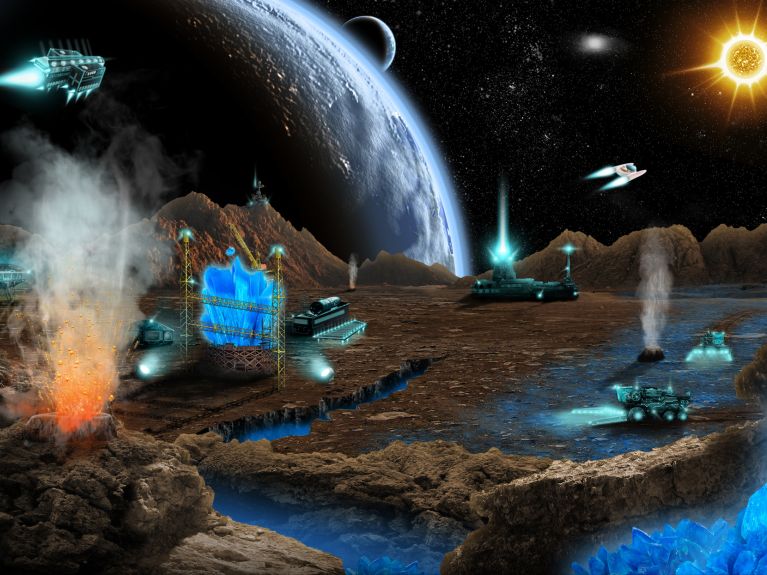Germany relies on space mining
Will raw materials from outer space secure the future of German industry? Answers to six key questions.

In August 2018, the Federal Association of German Industry (BDI) introduced a new futuristic industry to the political agenda. In a position paper it makes the case for preparing for extraterrestrial mining. Science fiction or soon a reality? This is what the experts say:
Why is space mining important for Germany?
Valuable raw materials like platinum, nickel or cobalt are becoming scarcer on Earth, but remain indispensable for future technologies. And the possibilities of commercially viable extraction in space grow with technological progress.
What is the BDI’s objective?
The BDI’s initial aim is a national space law that makes private investment and innovation possible. “It should be passed during this parliamentary term,” says Matthias Wachter, head of the BDI’s Department of Security and Raw Materials and one of the authors of the position paper. Germany should follow the example of Luxembourg, he says, the only country apart from the USA that has a space mining law.

How much potential is there for raw materials from space?
Some estimates claim that an asteroid with a diameter of one kilometre is enough to meet the world’s population’s demand for metallic raw materials for decades. We know of 700,000 asteroids to date; 17,000 are located close to the Earth and suitable for space mining.
How would space mining work?
As early as the next ten years, small space probes could fly into the orbits of the inner planets to locate near-Earth, potentially resource-rich asteroids. Highly specialized devices would scan individual asteroids, collect samples, analyse their raw-material content and send the results back to Earth. Once the probes have found suitable asteroids, larger, unmanned spacecraft could fly there, and robots would extract the raw materials.
How advanced is Germany in space mining?
German industry is well positioned in propulsion engineering, analytics, sensor technology, robotics and mining technology. The Bremen-based space and technology group OHB has already founded a subsidiary for extraterrestrial projects in Luxembourg. And in Berlin, several start-ups are pursuing new space projects, Wachter reports. “Space legislation would give them a real push.”
What do space experts say?
Professor Ralf Jaumann, planetary geologist at the German Aerospace Centre (DLR), does not see large-scale space mining happening any time soon. “The availability, concentration and accessibility of raw materials in space is fantastic. But I’m sceptical about the economic viability.” His forecast: humans will take over space, but it will take a longer period of about 50 years.

